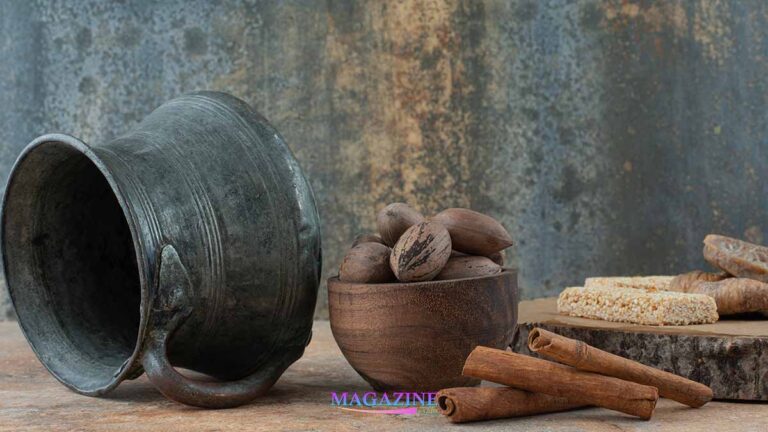Unleash the Ayurvedic Chef Within: Best Utensils for a Healthy, Blissful Kitchen
Spice up your cooking and your life with the wisdom of Ayurveda, the ancient Indian science of holistic living. But it’s not just about exotic spices and chanting mantras – Ayurveda extends even to the tools you use to nourish your body and soul. That’s where choosing the right cooking utensils becomes an act of self-care, aligning your meals with the principles of balance and well-being.
So, ditch the stainless steel fatigue and discover the magic of Ayurvedic cookware! Here’s a guide to the best utensils for a kitchen that’s healthy, happy, and vibrant:
Table of Contents
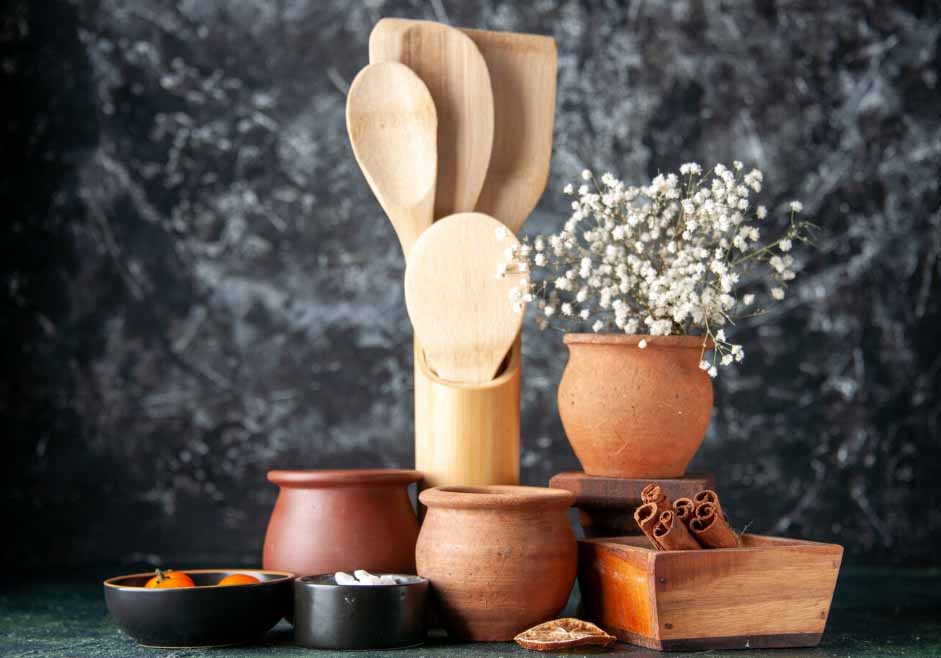
1. Earthenware (Clay Pots): Ayurveda sings the praises of earthenware for a reason. Clay is naturally porous, allowing air to circulate and preventing overheating. This results in food retaining its nutrients and developing a deeper, earthier flavor. Think slow-cooked dals, steaming curries, and fluffy rice – all bursting with goodness thanks to your clay pots.
2. Cast Iron: This heavy-duty wonder is not just for muscle-building exercises. Cast iron distributes heat evenly and retains it beautifully, perfect for everything from pan-frying vegetables to baking rotis. Plus, its iron content naturally leaches into your food, boosting your iron levels with every bite.
3. Copper: Ayurveda’s golden child, copper utensils have antibacterial properties that help keep your food fresh and free from harmful bacteria. Their ability to conduct heat quickly makes them ideal for boiling milk, reducing its time on the stove and preserving its nutrients. Just remember, acidic foods shouldn’t mingle with copper, so stick to water, milk, and sweets in these beauties.
4. Stainless Steel (with caution): While not an Ayurvedic favorite, stainless steel can find a place in your kitchen if used wisely. Opt for high-quality, food-grade stainless steel and avoid acidic or salty foods to prevent metal leaching. And remember, never overheat an empty stainless steel pan – that’s a recipe for burnt bottoms and potential toxins.
5. Wood: Nature’s gentle touch extends to your kitchen tools with wooden spoons and spatulas. They’re kind to your cookware, preventing scratches and preserving its lifespan. Plus, wood doesn’t leach chemicals or alter the taste of your food, ensuring a pure and wholesome experience.
Beyond the Utensils:
Remember, Ayurveda is about holistic living. So, choose natural cleaning agents like lemon and salt to keep your cookware sparkling. Store your food in airtight containers, preferably made from glass or clay, to prevent contamination and preserve freshness. And lastly, cook with love and gratitude, infusing your meals with positive energy for a truly Ayurvedic feast.
See more : Advantages and Disadvantages of Brass Utensils for Food
What are the benefits of using ayurvedic utensils for cooking?
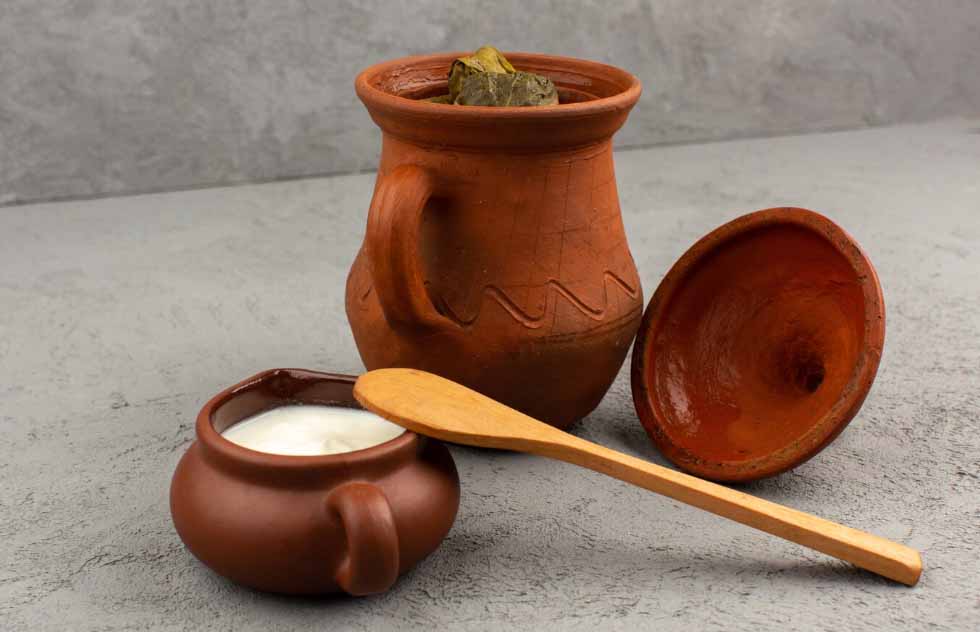
Choosing Ayurvedic cooking utensils is more than just a trend; it’s a commitment to a holistic approach to cooking and well-being. You can see some key benefits below:
Enhanced Flavor and Nutrition:
- Earthenware pots: Air circulation prevents overheating, preserving nutrients and creating deeper, earthier flavors.
- Cast iron: Distributes heat evenly, leading to consistent cooking and preserving vitamins and minerals.
- Copper: Conducts heat quickly, reducing cooking time and minimizing nutrient loss.
Improved Health and Hygiene:
- Copper and silver: Possess antibacterial properties, hindering the growth of harmful bacteria in your food.
- Non-reactive materials: Clay, cast iron, and wood avoid leaching chemicals into your food, unlike some stainless steel types.
Environmentally Friendly Choices:
- Sustainable materials: Clay, cast iron, and wood are all natural and durable, reducing waste and supporting eco-friendly practices.
- Longevity: These utensils, when cared for properly, can last for generations, minimizing unnecessary replacements.
Holistic Well-being:
- Mindful cooking: Using traditional utensils can connect you to the ancient wisdom of Ayurveda and promote mindful cooking practices.
- Positive energy: Ayurveda emphasizes cooking with love and gratitude, which can positively impact the energy in your food and your own well-being.
It’s important to note:
- Not all Ayurvedic utensils are suitable for all types of food. Copper, for example, shouldn’t be used with acidic foods.
- Investing in high-quality Ayurvedic utensils might require a higher initial cost compared to some conventional options.
- The benefits of Ayurvedic cooking are often individual and based on your specific needs and sensitivities.
However, if you’re looking for a way to:
- Improve the flavor and health benefits of your meals
- Cook with natural, non-toxic materials
- Support a sustainable lifestyle
- Embrace a more mindful approach to cooking
Then incorporating Ayurvedic utensils into your kitchen can be a rewarding and enriching experience. It’s a chance to connect with your food, your environment, and your own well-being in a truly holistic way.
Best utensils for milk boiling ayurveda
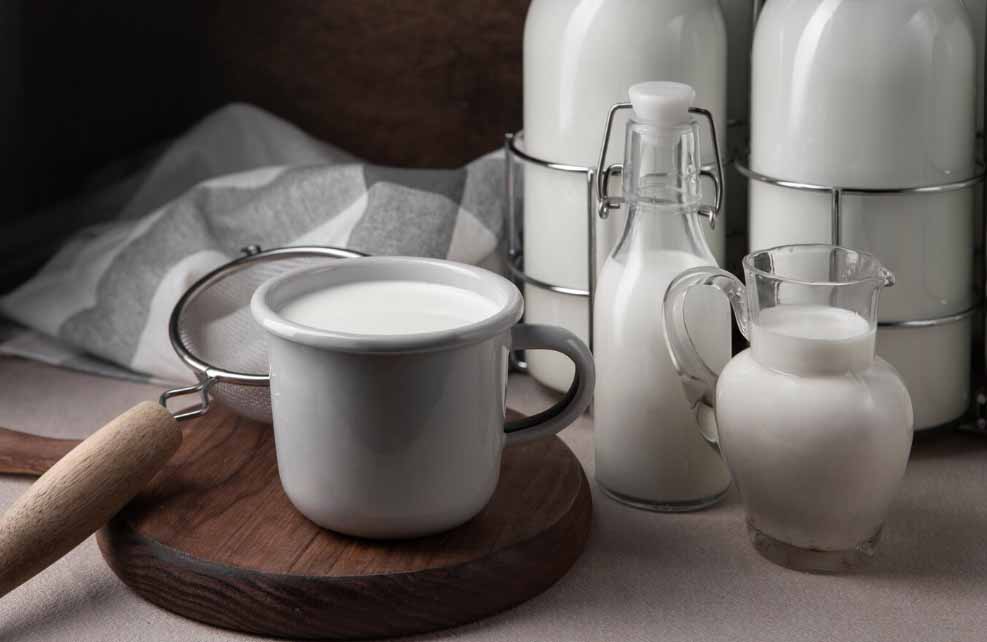
In Ayurvedic cooking, choosing the right utensil for boiling milk is crucial for both taste and health. Here are the top contenders and their advantages:
1. Earthenware (Clay Pots):
- Pros: Porous nature releases subtle steam, preventing scalding and preserving milk’s delicate flavor. Adds a subtle earthy taste, harmonizing with spices used in traditional milk drinks.
- Cons: Requires soaking before use. Takes longer to heat compared to metals.
2. Copper:
- Pros: Excellent heat conductor, boils milk quickly, reducing time spent at high temperatures. Antibacterial properties help keep milk fresh.
- Cons: Reacts with acidic ingredients, not suitable for adding spices directly to the milk. Requires specific cleaning with lemon and salt.
3. Cast Iron:
- Pros: Distributes heat evenly, preventing scorching and ensuring consistent cooking. Adds a slight iron boost to the milk.
- Cons: Heavy and takes longer to heat than copper. Not recommended for adding acidic ingredients directly.
4. Stainless Steel (with caution):
- Pros: Easy to clean and maintain. Affordable and readily available.
- Cons: Can leach metal into milk if low quality or used with acidic ingredients. Not ideal for long boiling times.
Bonus:
- Brass utensils: Traditionally used for boiling milk in India, but requires good cleaning and maintenance.
Choosing the best:
- For pure taste and earthy notes: Earthenware or clay pots.
- For quick boiling and anti-bacterial benefits: Copper, but avoid adding spices directly.
- For even heat distribution and iron boost: Cast iron, but avoid acidic ingredients.
- For convenience and affordability: Stainless steel, but choose high quality and avoid long boiling times.
What are the different types of ayurvedic utensils?
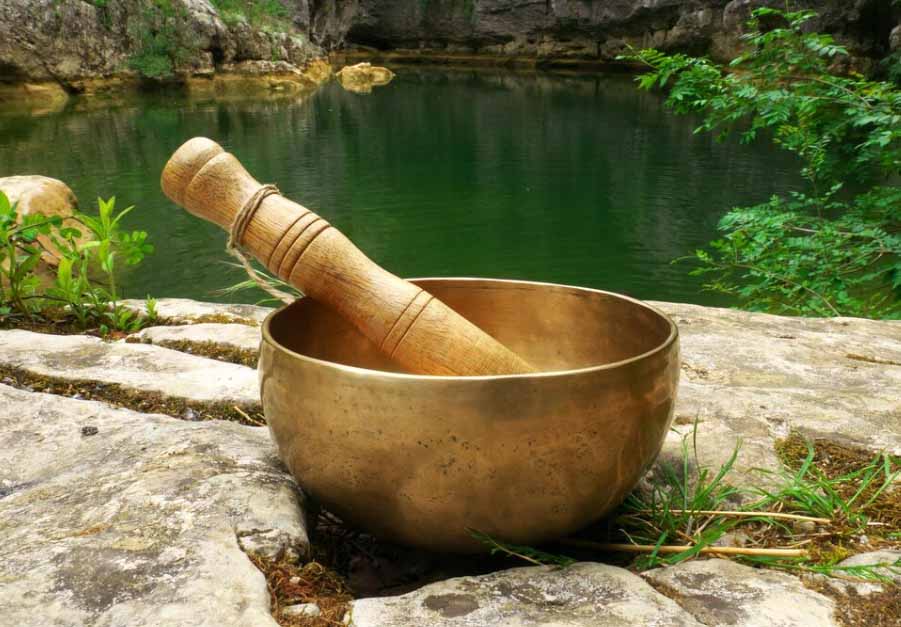
Ayurveda recommends the use of specific utensils for cooking to enhance the taste and health benefits of food. The following are some of the recommended utensils for cooking according to Ayurveda:
- Copper Utensils: For Ayurvedic doctors, copper pots are the secret to the tastiest and healthiest dishes. Copper heats up quickly, reducing cooking time, and does not oxidize.
- Brass Utensils: Brass utensils are recommended for specific ingredients in Ayurvedic cooking.
- Kansa Utensils: Also known as bronze utensils, Kansa is an alloy of copper and tin. It is known for its stress-relieving, holistic healing, and purifying properties. It has the ability to kill microorganisms, making it hygienic for eating.
- Clay Pots (Earthenware): Clay pots are favored in Ayurvedic cooking due to their natural properties, such as even heat distribution.
- Cast Iron Pans: Cast iron pans are durable and have excellent heat retention, making them suitable for Ayurvedic cooking.
- Stainless Steel Cookware: Stainless steel cookware is recommended for Ayurvedic cooking as it is non-reactive and easy to clean.
- Wooden Cooking Utensils: Wooden spatulas and spoons are recommended for stirring and serving food in Ayurvedic cooking.
- Glassware for Storage: Glassware is recommended for storing food in Ayurveda.
These utensils are believed to have specific properties that make food tasty and healthy, and using them can contribute to a healthy lifestyle in line with Ayurvedic principles.
How do ayurvedic utensils affect the taste of food?

The way Ayurvedic utensils affect the taste of food is a multi-faceted experience, going beyond just the material itself. Some key factors are given below:
Heat Distribution and Retention:
- Earthenware and cast iron: These materials distribute heat evenly and retain it well, leading to consistent cooking and preventing hot spots. This results in more balanced flavors and avoids burnt notes.
- Copper: Conducts heat incredibly fast, ensuring quick cooking and preserving delicate flavors that might otherwise diminish with prolonged exposure to heat.
Chemical Interactions:
- Copper: Reacts slightly with acidic foods, adding a subtle, metallic tang that compliments sweet and savory dishes alike. However, it’s recommended not to use copper for highly acidic foods to avoid unpleasant off-flavors.
- Clay: Naturally porous, clay allows some moisture to evaporate during cooking, concentrating flavors and creating a deeper, earthier taste profile.
Mindful Cooking Practices:
- Ayurvedic cooking emphasizes cooking with intention and awareness. Using traditional utensils like clay pots or cast iron can connect you to the process and encourage a slower, more mindful approach. This deliberate practice can subtly influence the final taste of your food.
Holistic Well-being:
- Ayurveda promotes the interconnectedness of mind, body, and spirit. Choosing natural, non-toxic cookware can contribute to a sense of well-being, which indirectly impacts the perception of taste and enjoyment of food.
Limitations:
- It’s important to note that the taste differences might not be drastic and can vary depending on individual preferences and the specific ingredients used.
- Additionally, some materials like stainless steel have minimal impact on taste, while wood primarily focuses on preserving the integrity of the cookware.
Overall, while Ayurvedic utensils can certainly influence the taste of food, it’s a combination of the material’s inherent properties, mindful cooking practices, and the holistic well-being they promote that creates a unique and potentially more flavorful culinary experience.
Embrace these Ayurvedic cooking principles and choose the right utensils to:
- Nourish your body with delicious and healthy meals.
- Embark on a journey of mindful living, one mindful bite at a time.
- Transform your kitchen into a haven of balance and well-being.
Unlock the secrets of Ayurvedic cooking and discover a world of culinary wellness in your own kitchen!
Bon appétit, with a touch of Ayurveda!

